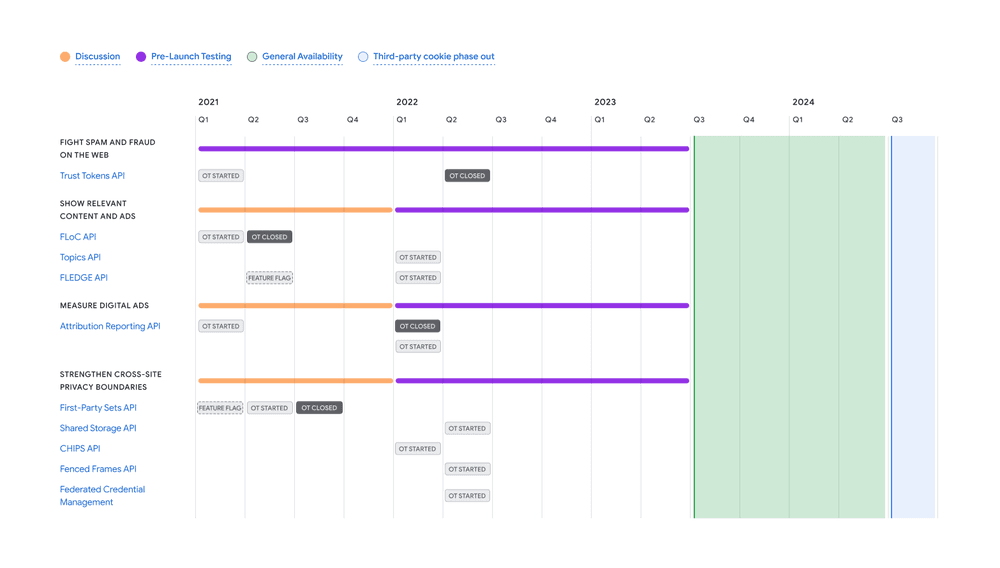Accessibility Tools
PMG Digital Made for Humans
The Takeaway: Google Delays Third-Party Cookie Deprecation
3 MINUTE READ | July 28, 2022
The Takeaway: Google Delays Third-Party Cookie Deprecation
Abby Long
Abby manages PMG's editorial & thought leadership program. As a writer, editor, and marketing communications strategist with nearly a decade of experience, Abby's work in showcasing PMG’s unique expertise through POVs, research reports, and thought leadership regularly informs business strategy and media investments for some of the most iconic brands in the world. Named among the AAF Dallas 32 Under 32, her expertise in advertising, media strategy, and consumer trends has been featured in Ad Age, Business Insider, and Digiday.
Google will punt third-party cookie deprecation to 2024, giving advertisers, developers, and publishers more time to phase out third-party cookies and test into the alternatives proposed in Google’s Privacy Sandbox. For many in the ad industry, the postponement wasn’t a surprise but did provide some relief. Despite the many alternative identity and measurement solutions proposed, from on-device processing to identity management and data clean rooms, a consensus has yet to be reached on what privacy-first technology should ultimately replace the cookie, hampering testing roadmaps and future-proofing initiatives for both advertisers and publishers.
In the announcement, Google’s vice president of Privacy Sandbox, Anthony Chavez, shared what advertisers and developers can expect in the months to come as a result of Privacy Sandbox’s updated timetable.
Beginning in early August, Google will expand testing for its Privacy Sandbox to millions of users globally, helping to gradually increase the testing population available to developers who are experimenting with Google’s proposed cookie alternatives. Privacy Sandbox APIs will also be launched and generally available to developers by Q3 2023. In short, the biggest change is to expand Privacy Sandbox testing before third-party cookies are disabled in the Google Chrome web browser. For advertisers, initial functional testing with the Privacy Sandbox API will continue in Google Ad Manager, AdSense, DV360, and Google Ads.
Catch Up Quick: The Privacy Sandbox is a Google-led initiative to create web standards that access user information without compromising their privacy. Acting as a testing ground for various proposed solutions, the purpose of the Privacy Sandbox is to facilitate online advertising without the use of third-party cookies, which are being actively phased out across the open web due to privacy concerns.

See the updated timeline and more details on the Privacy Sandbox website.
Developer feedback and Google’s commitment, announced earlier this year, to partner with the UK’s Competition and Markets Authority (CMA), were likely the driving force behind Google’s decision to delay third-party cookie deprecation to 2024. According to Chavez, the most consistent feedback Google receives is “the need for more time to evaluate and test the new Privacy Sandbox technologies before deprecating third-party cookies in Chrome.” Google is working closely with the CMA and the UK’s Information Commissioner’s Office (ICO) to ensure that the Privacy Sandbox initiative protects consumers and supports a “competitive ad-funded web,” without favoring Google products.
Regardless of Google’s timetable, the ad industry has clear marching orders: Cookies are going away, and privacy-first advertising is the future. Already, more than 45 percent of online, mobile in-app, and CTV advertising is cookieless, according to an Adweek statement by LiveRamp’s Travis Clinger, senior vice president of addressability and ecosystem. Of course, Google Chrome still remains the most popular global web browser, capturing two-thirds of the market, while Google’s advertising unit serves as the biggest advertising platform in the world, making any move Google makes an important one.
The extended timetable provides advertisers the opportunity to continue to test cookieless approaches alongside tried-and-true operating models for longer, helping to measure the impact of signal loss and develop more reliable proxies. Seasonality differences like holiday shopping patterns, in addition to other consumer behavior shifts, may have been more difficult to measure had the deprecation of third-party cookies been scheduled for 2023.
“Early PMG testing of cookieless solutions has shown cost efficiencies and provided brands with a competitive advantage in market,” said Mary O’Brien, programmatic director at PMG. “We’re interested to see if this trend continues now that cookie deprecation has been delayed to 2024.”
The delay also builds confidence in the reliability of data clean rooms and other cookieless identity solutions. While Google was one of the first technology platforms to unveil alternative solutions, recent news that Disney will partner with The Trade Desk to utilize Unified ID 2.0 and its data clean room technology signals that publishers are actively seeking competitive solutions beyond the Privacy Sandbox to replace third-party cookies.
Stay in touch
Bringing news to you
Subscribe to our newsletter
By clicking and subscribing, you agree to our Terms of Service and Privacy Policy
“The delay gives advertisers some extra time, but it does not change the fact that third-party cookies are going away, and advertisers must plan accordingly,” said Jason Hartley, head of search, shopping and social at PMG. “While there is now more time to prepare, advertisers shouldn’t deprioritize their efforts to prepare for a cookieless future, as it’s unlikely that Google will move this deadline again.”




